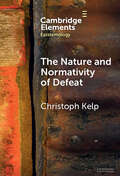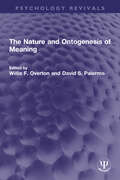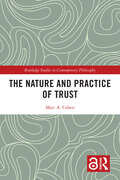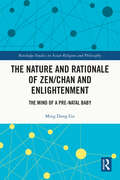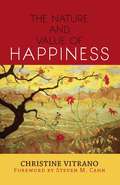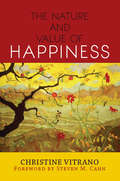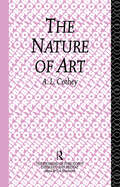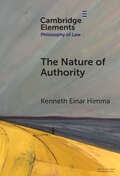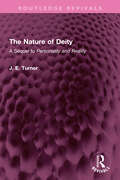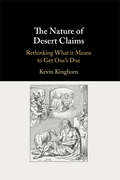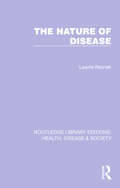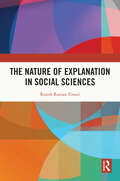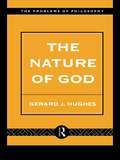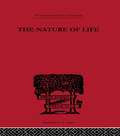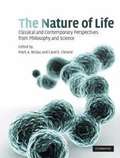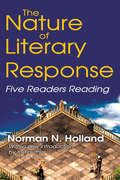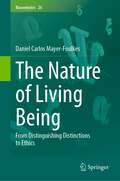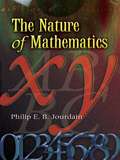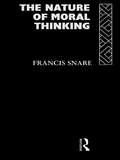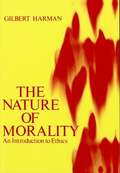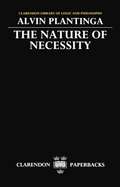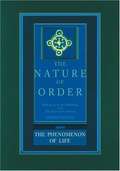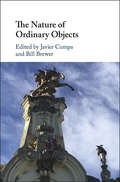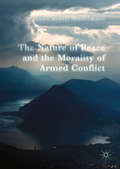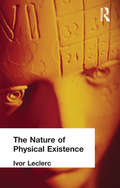- Table View
- List View
The Nature and Normativity of Defeat (Elements in Epistemology)
by Christoph KelpDefeat is the loss of justification for believing something in light of new information. This Element mainly aims to work towards developing a novel account of defeat. It distinguishes among three broad views in the epistemology of defeat: scepticism, internalism, and externalism and argues that that sceptical and internalist accounts of defeat are bound to remain unsatisfactory. As a result, any viable account of defeat must be externalist. While there is no shortage of externalist accounts, the Element provides reason to think that extant accounts remain unsatisfactory. The Element also explains the constructive tasks of developing an alternative account of defeat and showing that it improves on the competition.
The Nature and Ontogenesis of Meaning (Psychology Revivals)
by Willis F. Overton David S. PalermoThroughout its evolution, Piaget's theory has placed meaning at the center of all attempts to understand the nature and development of knowing. For Piaget, all knowing – whether sensorimotor, representational, or reasoned, and whether directed toward successful problem solutions or toward general understanding – is necessarily a construction which arises out of meaning making activity. It was in this context that the editors of this volume, originally published in 1994, approached the board of directors of the Jean Piaget Society with a proposal to organize a recent annual symposium around the topic of the nature and development of meaning. In forming this symposium and in moving from symposium to integrated text, the editors wanted to insure both a breadth and depth to the analysis of the topic. Addressing philosophical, theoretical, and empirical perspectives, this issue-oriented volume provides an integrated exploration of the current understanding of the nature and development of meaning. Contemporary issues that frame alternative understandings of the nature of meaning – nativist vs. constructivist positions, and computational vs. embodied mind contexts – are examined as they impact on the investigation of meaning. Comparative, cognitive, and linguistic developmental dimensions of meaning are described and discussed.
The Nature and Practice of Trust (Routledge Studies in Contemporary Philosophy)
by Marc A. CohenAcross the social sciences and even in philosophy, trust is most often characterized in terms of expectations and probabilities. This book defends an alternative conception of trust as a moral phenomenon. When one person trusts another to do something, the first relies on the second’s commitment(s). So, trust reflects—and is a product of—agreement about the commitments and obligations that bind persons who live and work together. These commitments and obligations can be implicit, but building (or rebuilding) trust often requires making these commitments and obligations explicit, defining the terms of cooperation. Part 1 argues that this account of trust better captures our actual trust practices, and it draws out connections with both the philosophy and the social science literatures. It also describes the process of creating trust relationships with reference to trust invitations. Part 2 addresses practical applications of the account defended here, in the context of social relationships, economic systems, and within business organizations. These applications emphasize the material benefits of trust but, separate from those, Part 2 argues that trust is an intrinsic good—so we have moral reason to trust. The Nature and Practice of Trust will appeal to scholars and advanced students working in ethics, social and political philosophy, and the social sciences. Chapter 6 of this book is available for free in PDF format as Open Access from the individual product page at www.routledge.com. It has been made available under a Creative Commons Attribution-Non Commercial-No Derivatives 4.0 license.
The Nature and Rationale of Zen/Chan and Enlightenment: The Mind of a Pre-Natal Baby (Routledge Studies in Asian Religion)
by Ming Dong GuThis book initiates a paradigm shift away from Zen/Chan as quintessentially Buddhist and examines what makes Chan thought and practice unique and original through an interdisciplinary investigation of the nature and rationale of Chan and its enlightenment. Exploring how enlightenment is achieved through Chan practice and how this differs from other forms of Buddhism, the book offers an entirely new view of Chan that embraces historical scholarship, philosophical inquiry, textual analysis, psychological studies, Chan practice, and neuroscientific research and locates the core of Chan in its founder Huineng’s theory of no thinking which creatively integrates the Taoist ideas of zuowang (forgetting in seated meditation) and xinzhai (fast of heart-mind) with his personal experiences of enlightenment. It concludes that Chan is the crystallization of an innovative synthesis of Buddhism, Daoism, and Confucianism as well as other resources of somatic and spiritual cultivation, and enlightenment is a momentary return to the mental state of a baby before birth. This book will appeal to students and scholars of religion, philosophy and neuroscience. It will also offer new insights to thinkers, writers, artists, therapists and neuroscientists as well as those practicing Zen, Mindfulness and psychotherapy.
The Nature and Value of Happiness
by Christine VitranoThe Nature and Value of Happiness provides a historic and contemporary overview of the philosophy of happiness, with critical evaluations to help students analyze the material and trace the evolution of a deeply nuanced concept. Addressing how the modern notion of happiness has changed from its ancient origins, Christine Vitrano attempts to clarify the precise value of happiness. This search leads Vitrano to examine topics such as the moral requirements of happiness and whether happiness can be considered the greatest good or simply one good among many. The philosophical theories are presented in a way that is accessible to anyone interested in learning about happiness, regardless of previous philosophical study. All technical terms and concepts are clearly explained, and illustrative examples tied into the text bring the material to life and help establish the relevance of the subject to readers. The ultimate goal is to reach a definition of the nature of happiness that best reflects the way we use the word today. This book is a welcome addition to the growing literature on happiness and is ideal for initiating provocative discussions in courses on happiness and ethics.
The Nature and Value of Happiness
by Christine VitranoThe Nature and Value of Happiness provides a historic and contemporary overview of the philosophy of happiness, with critical evaluations to help students analyze the material and trace the evolution of a deeply nuanced concept. Addressing how the modern notion of happiness has changed from its ancient origins, Christine Vitrano attempts to clarify the precise value of happiness. This search leads Vitrano to examine topics such as the moral requirements of happiness and whether happiness can be considered the greatest good or simply one good among many. The philosophical theories are presented in a way that is accessible to anyone interested in learning about happiness, regardless of previous philosophical study. All technical terms and concepts are clearly explained, and illustrative examples tied into the text bring the material to life and help establish the relevance of the subject to readers. The ultimate goal is to reach a definition of the nature of happiness that best reflects the way we use the word today. This book is a welcome addition to the growing literature on happiness and is ideal for initiating provocative discussions in courses on happiness and ethics.
The Nature of Art (Problems of Philosophy)
by A. L. CotheyAlthough various aesthetic themes have preoccupied many major philosophers, from Plato to Goodman, the central questions of the philosophy of art have remained ill-defined. This book gives a concise and systematic account of the leading philosophical ideas about art and aesthetics from ancient times to the present day, and goes on to propose a new theory of aesthetic satisfaction and artistic abilities.
The Nature of Authority (Elements in Philosophy of Law)
by Kenneth Einar HimmaThe Nature of Authority provides a comprehensive theory of the nature of authoritative guidance. It argues that the following claims exhaust the constitutive properties of authoritative tellings: authoritative tellings (1) tell subjects what to do; (2) give rise to reasons to comply; (3) are issued by personal beings and govern the behavior of personal beings; (4) are issued by rationally competent beings and govern the behavior of rationally competent beings; (5) are issued under a claim of right that counts as plausible in virtue of being grounded in a system to which subjects acquiesce as governing their behavior; (6) are issued by beings with the power to impose their will on subjects with respect to what they do; (7) create obligations to comply; and (8) are backed by a threat of detriment that is reasonably contrived to deter enough noncompliance to enable the system to minimally achieve its ends.
The Nature of Deity: A Sequel to 'Personality and Reality' (Routledge Revivals)
by J. E. TurnerFirst published in 1927, The Nature of Deity forms a sequel to Personality and Reality. The premise of this book is the conclusion of the prequel: that there exists a Supreme Self or Deity. In pursuing this argument, the author uses logic and broad facts that prove the existence of a Supreme Self. This book will be of interest to students of philosophy, religion, literature and science.
The Nature of Desert Claims: Rethinking What it Means to Get One's Due
by Kevin KinghornOur everyday conversations reveal the widespread assumption that positive and negative treatment of others can be justified on the grounds that 'they deserve it'. But what is it exactly to deserve something? In this book, Kevin Kinghorn explores how we came to have this concept and offers an explanation of why people feel so strongly that redress is needed when outcomes are undeserved. Kinghorn probes for that core concern which is common to the range of everyday desert claims people make, ultimately proposing an alternative model of desert which represents a fundamental challenge to the received wisdom on the structure of desert claims. In the end, he argues, our plea for deserved treatment ends up being linked to the universal human concern for a shared narrative, as we seek healthy relationships within a community.
The Nature of Disease (Routledge Library Editions: Health, Disease and Society #21)
by Lawrie ReznekOriginally published in 1987, this book is about the classification of bodily conditions into diseases. It provides a full account of the concept of disease, examining the issue of whether disease status is something we discover or invent and the issue of whether disease attributions involve implicit value judgements. It investigates whether bodily conditions fall into natural kinds and whether these debates can be settled by discovering whether there are any natural boundaries dividing conditions into diseases and non-diseases. It considers whether the notion of disease is an evaluative notion or whether judgements about disease status are purely descriptive. The issue of whether other cultures with different values are justified in making different disease judgements is also discussed.
The Nature of Explanation in Social Sciences
by Rajesh Ranjan TiwariThis book provides a comprehensive overview of the nature of explanations as given in both natural and social sciences. It discusses models of explanation adopted in natural and social sciences. The author also elaborates upon naturalistic and anti-naturalistic views and other types of explanations such as functional, purposive, etc in social science. The volume elaborates upon themes like bridge principle; functional explanation; purposive explanation; teleological explanation; prediction; methodological individualism; methodological collectivism; illocutionary redescription; principle of action; and dispositional explanations, to understand whether the explanations given in the realm of social sciences are the same or different from the explanations that are given in the field of natural sciences. This introductory book is a must read for students and scholars of philosophy of science, logic, science and technology studies, social sciences, and philosophy in general.
The Nature of God: An Introduction to the Philosophy of Religion (Problems of Philosophy)
by Gerard HughesFirst published in 1995. Routledge is an imprint of Taylor & Francis, an informa company.
The Nature of Life (International Library of Philosophy)
by R. RignanoFirst published in 2000. This is Volume IV of six in the Library of Philosophy series on the Philosophy of Science. Written in 1930, this volume looks at the nature of vital phenomena, which has been for so long the subject of dispute between vitalists and mechanists. It discusses the concepts of purpose, explanation and phenomena, the attitudes around and differences of categorisation.
The Nature of Life: Classical and Contemporary Perspectives from Philosophy and Science
by Mark A. Bedau Carol E. Cleland"Bringing together the latest scientific advances and some of the most enduring subtle philosophical puzzles and problems, this book collects original historical and contemporary sources to explore the wide range of issues surrounding the nature of life. Selections ranging from Aristotle and Descartes to Sagan and Dawkins are organised around four broad themes covering classical discussions of life, the origins and extent of natural life, contemporary artificial life creations and the definition and meaning of 'life' in its most general form. Each section is preceded by an extensive introduction connecting the various ideas discussed in individual chapters and providing helpful background material for understanding them. With its interdisciplinary perspective, this fascinating collection is essential reading for scientists and philosophers interested in astrobiology, synthetic biology and the philosophy of life"--
The Nature of Literary Response: Five Readers Reading
by Clark McPhailIn a rare fusion of literary sensibility with psychological research, Norman N. Holland brings to light important data showing how personality—in the fullest sense of character development and identity—affects the way in which we read and interpret literature. This book will show that readers respond to literature in terms of their own lifestyle, character, personality, or identity. By such terms, psychoanalytic writers mean an individual's characteristic way of dealing with the demands of outer and inner reality. Each new experience develops the style, while the pre-existing style shapes each new experience.The sub-title of this book, Five Readers Reading, reflects the fact that the author, a distinguished literary critic, worked with five student readers, using a battery of psychological tests and extensive interviews to study the ways they reacted to classic short stories by Faulkner, Hemingway, and others. Combining his own interpretation of the stories with his understanding of the readers and their reactions, Holland derives four principles that inform literary response. He then goes on to show how these principles apply, not just to literary response, but to the way personality shapes any experience.The book carries Holland's previous studies of creation and responsive recreation forward to a major theoretical statement. He rejects the artificial idea that one must think of a text (or other event) as separate from its perceivers, illustrating the dynamics by which perceiver and perceived mutually create an experience. For critics and students of the psychology of human behavior, this is challenging and seminal reading.
The Nature of Living Being: From Distinguishing Distinctions to Ethics (Biosemiotics #26)
by Daniel Carlos Mayer-FoulkesThis book proposes a bold idea. Living beings are distinguishing distinctions. Single cells and multicellular organisms maintain themselves distinct by drawing distinctions. This is what organisms are and what they do. From this starting point, key issues examined range across ontology, epistemology, phenomenology, logic, and ethics. Topics discussed include the origin of life, the nature and purpose of biology, the relation between life and logic, the nature and limits of formal logic, the nature of subjects, the subject-object relation, subject-subject relationships and the deep roots of ethics. The book provides a radical new foundation to think about philosophy and biology and appeals to researchers and students in these fields. It powerfully debunks mechanical thinking about living beings and shows the vast reservoir of insights into aliveness available in the arts and humanities.
The Nature of Mathematics
by Philip E. JourdainAnyone with an interest in mathematics will welcome the republication of this little volume by a remarkable mathematician who was also a logician, a philosopher, and an occasional writer of fiction and poetry. Originally published in 1913, and later included in the acclaimed anthology The World of Mathematics, Jourdain's survey shows how and why the methods of mathematics were developed, traces the development of mathematical science from the earliest to modern times, and chronicles the application of mathematics to natural science.Starting with the ancient Egyptians and Greeks, the author profiles mathematics' rise and progress with the development of analytical methods by Descartes, Galileo, Newton, Leibnitz, and others. The text focuses on principles rather than techniques, exploring the foundations of algebra, analytical geometry, and the method of indivisibles. It discusses the beginnings of the correlation of mathematics and natural science in the study of dynamics as well as the emergence of modern mathematics with the infinitesimal calculus. Additional topics include contemporary views of limits and numbers and a brief summation of the nature of mathematics.
The Nature of Moral Thinking
by Francis SnareThe Nature of Moral Thinking is an introductory text to the questions of ethics, offering a solid philosophical and historical basis for understanding the central issues. Francis Snare discusses in detail the classical philosophical arguments of Plato and Butler in relation to relativism and subjectivism and treats Marx and Nietzsche in regard to the origins and explanation of morality.
The Nature of Morality: An Introduction to Ethics
by Gilbert HarmanContains an overall account of morality in its philosophical format particularly with regard to problems of observation, evidence, and truth.
The Nature of Necessity
by Alvin PlantingaThis book, one of the first full-length studies of the modalities to emerge from the debate to which Saul Kripke, David Lewis, Ruth Marcus, and others are contributing, is an exploration and defense of the notion of modality de re, the idea that objects have both essential and accidental properties. Plantinga develops his argument by means of the notion of possible worlds and ranges over such key problems as the nature of essence, transworld identity, negative existential propositions, and the existence of unactual objects in other possible worlds. He also applies his logical theories to the elucidation of two problems in the philosophy of religion: the problem of evil and the ontological argument.
The Nature of Order, An Essay on the Art of Building and the Nature of the Universe: Volume 1, The Phenomenon of Life
by Christopher AlexanderWhat is happening when a place in the world has life? And what is happening when it does not? In Book 1 of this four-volume work, Alexander describes a scientific view of the world in which all space-matter has perceptible degrees of life, and sets this understanding of living structure as an intellectual basis for a new architecture. He identifies fifteen geometric properties which tend to accompany the presence of life in nature, and also in the buildings and cities we make. These properties are seen over and over in nature, and in cities and streets of the past, but have all but disappeared in the deadly developments and buildings of the last one hundred years. The book shows that living structure depends on features which make a close connection with the human self, and that only living structure has the capacity to support human well-being. The other three volumes of The Nature of Order continue this thesis with three complementary views giving a masterful prescription for the processes which allow us to generate living structure in the world. They show us what such a world must gradually come to look like, and describe the modified cosmology in which "life" as an essential quality, together with our inner connection to the world around us-towns, streets, buildings, and artifacts-are central to a proper understanding of the scientific nature of the universe. "... Five hundred years is a long time, and I don't expect many of the people I interview will be known in the year 2500. Christopher Alexander may be an exception."--David Creelman, author, interviewer and editor, HR Magazine, Toronto. Christopher Alexander is a fellow of the American Academy of Arts and Sciences, architect, builder and author of many books and technical papers. He is the winner of the first medal for research ever awarded by the American Institute of Architects, and after 40 years of teaching is Professor Emeritus at the University of California, Berkeley.
The Nature of Ordinary Objects
by Javier Cumpa Bill BrewerThe metaphysics of ordinary objects is an increasingly vibrant field of study for philosophers. This volume gathers insights from a number of leading authors, who together tackle the central issues in contemporary debates about the subject. Their essays engage with topics including composition, persistence, perception, categories, images, artifacts, truthmakers, metaontology, and the relationship between the manifest and scientific images. Exploring the nature of everyday things, the contributors situate their arguments and the latest research against the background of the field's development. Moreover, many essays propose new ideas and approaches, looking ahead to the future of the metaphysical study of ordinary objects. Featuring numerous clearly explained examples and with thoughtful links drawn to other, related disciplines such as pragmatism, this wide-ranging volume fills a major gap in the literature and will be important for scholars working in metaphysics.
The Nature of Peace and the Morality of Armed Conflict
by Florian Demont-BiaggiThis book explores topical issues in military ethics by according peace a central role within an interdisciplinary framework. Whilst war and peace have traditionally been viewed through the lens of philosophical enquiry, political issues and theological ideas - as well as common sense - have also influenced people's understanding of armed conflicts with regards to both the moral issues they raise and the policies and actions they require. Comprised of fourteen essays on the role and application of peace, the book places emphasis on it's philosophical, moral, theological, technological, and practical implications. Starting with an overview of Kantian perspectives on peace, it moves to discussions of the Just War debates, religious conceptualizations of peace, and the role of peace in modern war technology and cyber-security. Finally concluding with discussions of the psychological and medical impacts of war and peace on both the individual and the larger society, this collection offers a contribution to the field and will be of interest to a wide audience. Chapters 4, 6 and 10 of this book are available open access under a CC BY 4. 0 license.
The Nature of Physical Existence
by Ivor LeclercThis is Volume II of six in a collection on Epistemology. Originally published in 1972, the central concern of this book is the understanding of the nature of the universe. Its field is thus that which until the eighteenth century had been known as philosophia naturalis, the philosophy of nature. The aim of the book is to elucidate and examine the fundamental concepts in terms of which the universe is understood.
